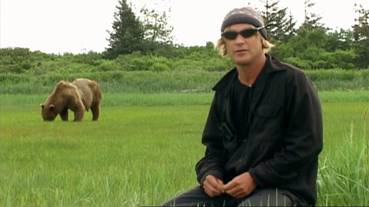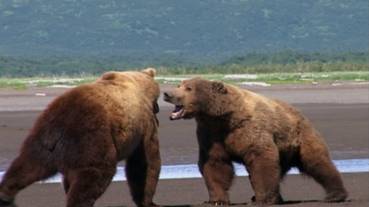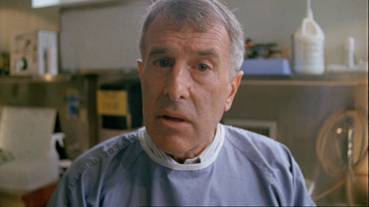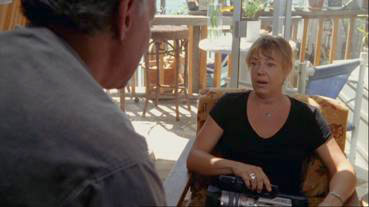| |
"No-one knew that, no-one ever frigging knew, that there are times when my life is on the precipice of death, that these bears can bite, they can kill, and if I am weak, I go down. I love them with all my heart, I will protect them, I will die for them, but I will not die at their paws and claws. I will fight, I will be strong, I'll be one of them. I will be....master." |
| |
Timothy
Treadwell, killed in 2003 by a grizzly bear |
The
story of Timothy Treadwell seems so perfectly suited to
the sensibilities of maverick German filmmaker Werner Herzog
that it actually comes as a surprise to discover
that the project landed in his lap almost by chance.
Visiting the offices of producer Erik Nelson, he was
looking for his car keys on the producer's
disorganised table, and Nelson, believing Herzog was looking at something
in particular, handed him an article on Treadwell and told
him they were making a film of his story. The director took
the article, read it and rushed back to ask who was directing
the film. Nelson admitted that the job had sort-of fallen
to him, and Herzog told him, "No, I will direct this
movie."*
Herzog
has been repeatedly fascinated by outsiders, both those
who arrive in society from the wilderness (The Enigma
of Kasper Hauser) and those who abandon society
itself in pursuit of a dream (Fitzcarraldo,
Aguirre, the Wrath of God), and whatever
else you might throw at Timothy Treadwell, he was certainly
a dream-chaser and in his small way sits up there with the
rest of Herzog's anti-heroes. An ex-alcoholic and failed
actor, he reinvented himself as a self-styled 'kind warrior',
travelling to the Alaskan peninsular for thirteen consecutive
summers to camp, usually alone, in the realm of the grizzly
bear, creatures he believed it was his mission in life to protect,
despite the fact that they were in National Park territory
and not really under threat. In a touch of irony that was
nonetheless tinged with inevitability, in 2003 he was killed
and eaten by one of the very animals he had repeatedly pledged
he would die for.

What
initially attracted Herzog, and what makes Treadwell's story so
cinematically fascinating, is that on the last five exhibitions
he took a video camera with him and shot over a hundred hours
of footage of the bears, other wildlife, and – crucially –
himself. As Herzog trawled through the tapes he discovered
not only some remarkable animal footage, but a fascinating
insight into the mind of a dedicated but troubled and ultimately
misguided man, whose death, in retrospect, seems less surprising
than his until-then continued survival. Treadwell's devotion
to the animals is clear, but his understanding of their
true nature is frequently called into question by his own
behaviour. Despite his oft-spoken warnings of the danger
the bears represent, there is the sense that he never really
believed his own words, and that they were delievered to camera to enhance
his self-made image as a man who regularly looked death in the face
but knew no fear. As the story unfolds it becomes clear
that this springs not from some macho act of bravado for
his own camera, but a genuine belief that he had developed
a kinship with the animals, that they would not think to
harm him because he is effectively one of them. Despite
his statements to the contrary, he never really sees the
bears as the potentially deadly predators they are, rather
as cuddly, Disneyfied creatures only a couple of steps away
from the teddy bear he still shared his tent with. He gives
them names like Mr. Chocolate, The Grinch and Sergeant Brown,
scolds them when they get too close and moments later coos declarations
of love and blows affectionate kisses at them. Over
and over he places himself in a position that just seems
to beg for one of the bears to take a swipe at him, and
more than once you suspect you'll actually see it happen,
not least when he strips to his shorts to join one of them
for a swim.
Herzog
has selected and edited the footage with real purpose and
care, in the process showing us all sides of Treadwell,
from the naïve man-child and self-centred egotist
to the troubled self-analyst and passionate conservationist.
He interweaves this material with interviews with friends, family
and acquaintances, some of which occasionally border on
the surreal, something emphasised by a camera that is prone to drift
towards interviewees who sometimes speak directly to it.
This slight reality dislocation is most evident in the interviews
with coroner Dr. Franc G. Fallico, whose practiced artificiality
turns even the description of the grisly remains of the
bear attack on Treadwell into slightly creepy performance,
one that is broken up into a series of very different
and specifically chosen shots like it might be in a fictional
feature. Elsewhere, the interviews are engagingly funny (ex-girlfriend
Jewel Palpvak's description of how she and Timothy met),
surprisingly cold-hearted (the helicopter rescue pilot who
suggests that Treadwell "got what he deserved")
or encroached on by locational elements, as with pilot Willy
Fulton, who regularly flew Treadwell to his camp and was
the one who discovered his body, and whose interview is conducted
amidst a swarm of buzzing insects.
Structurally
the film unfolds in engagingly non-linear fashion. Knowing
that Treadwell's death is the most famous aspect of his
story, Herzog deals with it up front, the first shot announcing
his timeline as 1957-2003, with the death itself covered in
specific detail just eight minutes in. Details of his childhood
and early life emerge much later, by when we have gone one-to-one
with Treadwell for long enough to know a little about (and
in an odd way rather like) the man whose life we are looking back
on, much as you might with a new-found acquaintance.

For
the most part, though, it's Treadwell's own footage that
steals the show. Comprised of a mixture of wildlife
documentary, video diary, staged inserts and promotion material
for his organisation Grizzly People (of which Jewel is a
key member), it runs the gamut of emotional responses, being
awe-inspiring, alarming, exciting, troubling and at times
hilarious. At his most involved, Treadwell is a too-easy
target for mockery (the accompanying featurette contains
an obvious example of this), but he does set himself up
for the fool at times, emotionally mourning the death of
a bee that died collecting pollen only to have it revive
and carry on its business, or commenting on the aftermath of
an awesomely shot bear fight like an excited reporter at
a WWF match. Elsewhere, his camera catches him loudly begging for rain to Jesus, Allah and
"the Hindu floaty thing" (rain that subsequently
arrives in torrents, it has to be said), interpreting a
smiley face drawn on a rock as a "very fucking frightening"
death threat, and squealing with excitement at the discovery
of a large mound of bear dung ("I can feel the poop!
This was just inside of her!"). The scene that
prompted the loudest laugh in the cinema is also one of
Treadwell's most telling to-camera moments, as a round-up
of the latest expedition turns into a expletive-filled rant
aimed at just about everyone who has ever given him a moment's
aggravation, only to switch suddenly and unexpectedly back
into Pleasant Presenter mode as if the previous few minutes
hadn't occurred.
The
film's acknowledged missing link is Amy Huguenard, Treadwell's
last girlfriend and the one who died with him in the so-named
Bear Maze. She did not share Treadwell's confidence with
the animals and was genuinely frightened of them, but accompanied
him nonetheless and even stayed with him when he was attacked,
despite his pleas for her to flee. That the two were apparently
on the verge of breaking up and that the fatal return to
the Bear Maze was an unscheduled, spur-of-the-moment decision
on Treadwell's part simply underlines the specific tragedy of her
death. Any insight she or her family may have been able
to offer was lost with her and her family's refusal to take
part in the film.
But
if Amy's tragedy was that she was killed in a place she
never really wanted to be, we come to realise over the course
of the film that Treadwell's death was ultimately no less
terrible. In an extraordinary final twist, Treadwell actually
recorded the sound of his own final moments on a camcorder
whose lens cap he did not have time to remove. Herzog wisely
chooses not to include it, but in the film's most emotionally
gut-wrenching moment he is is shown, from behind, listening to the tape,
fighting back tears as Jewel watches on in distress. "You
must never listen to this," he tells Jewel soberly.
"I think you should not keep it. You should destroy
it." It can't help but make you wonder how you would
react in the same situation if you had a tape of the death
of a loved one in your possession. It would be a hard-hearted person who would
not be moved by this scene.

It
is Herzog's presence in the voice-over that provides the
film with its structural backbone, occasionally breaking
off from the storytelling to come to Treadwell's defence,
"not as a conservationist, but as a film-maker,"
and to highlight the unexpected beauty of moments in Treadwell's
footage that might perhaps otherwise have passed most of
us by. But he also provides an equally entrenched counterpoint
to Treadwell's idealisation of nature, an opposing viewpoint that was vividly expressed back in 1982 in Burden
of Dreams during the filming of Fitzcarraldo in the Amazonian jungle, when he railed against nature and
described it as "obscene," a view here confirmed
when he states "I believe the common denominator of
the universe is not harmony, but chaos, hostility and murder."
Fellow
reviewer Camus has said to me on more than one occasion
that it does not matter a hoot what a person is passionate
about as long as they are passionate about something,
and you'll find precious few examples of a more driving
passion than that which consumes Timothy Treadwell. That
he was ultimately living a delusion seems beside
the point, and as many of us sit on our couches watching
DVDs and enjoying third-hand adventure through the efforts
of others, its all too easy to dismiss out-of-hand Treadwell's
efforts as cranky or misguided. But although he may have
been foolhardy, difficult to actually like and more than
a little detached from reality, Herzog's remarkable film
shows us a man who may have lived on the edge and died prematurely,
but whose life nonetheless had purpose and meaning beyond
what most of us will ever even try to achieve. In the final
shot, as Treadwell wanders up river with two grizzlies seemingly
in friendly tow to the strains of Richard Thompson's gorgeously
soulful improvised score, we are left with the sense that
the world is a slightly sadder and less interesting place
without him.
Before
I get onto the usual technical specs I have to point out
that the version released on DVD differs slightly from the
one shown in cinemas, and thus from the one Herzog prepared
for public viewing. The DVD version is missing a brief scene
in which Treadwell appears on the David Letterman show to
talk about his work. This is a particularly interesting
sequence, in part because it provides evidence of Herzog's
claim on his narration that Treadwell had reached national celebrity
status, but more crucially for Letterman's semi-jocular
question to Treadwell in which he wonders if one day we'll
be watching a story about Timothy Treadwell being eaten
by grizzlies, which provokes raucous audience laughter but
chillingly foreshadows Treadwell's demise. The scene was
apparently removed at Letterman's request, and while I
can understand his motivation, this still pisses me off
big time. He said what he said and if he now feels his comments
have backfired then he should be ready to live with it. More
to the point, the clip was obviously cleared for inclusion
in the film, and it seems a little schizophrenic to
later change your mind and demand a recut, which was only
possible anyway because of Letterman's status and influence.
Apparently the film screened on US cable TV with this scene
intact, so keep your DVD recorders on the ready when it
eventually gets shown here, just in case.
Treadwell's
footage was shot on mini-DV video on a Sony VX2000 and Herzog's
on Super-16 film, and the two very different sources were
then mastered to High Definition video before being transferred
to 35mm for theatrical distribution. With this in mind, the
anamorphic 1.85:1 transfer here is very good, although is
a little soft in places than and occasionally lacking in
punch. While this might be expected from such sub-35mm
source material, I have to say that I was struck by just
how good some (though not all) of Treadwell's footage looked
in the cinema following its transfer to film, and as a front
row junkie I really notice picture quality flaws. Contrast
and colour appear fine, and there are no other evident problems
with the transfer or the print.

The
are two soundtracks available, Dolby 2.0 stereo and Dolby
5.1 surround. The differences are mainly ones of spread
and the finer points of fidelity, but the 5.1 track is just
preferable in this respect, especially in its reproduction
of Richard Thompson's music. Oh, and the insects in that
pilot interview.
It
would be logical to include some more background info on
Timothy Treadwell or his organisation Grizzly People here,
but all we have is a documentary on the recording of the
score. Great. Well actually it is great. My initial scepticism
about the prospect of a 54 minute look at the creation of
the music score soon dissolved when I started watching
it. Not only is In the Edges: The Grizzly Man
Sessions (53:48) a very well shot and compiled
piece, but the process of scoring the film proves to be
a fascinating one. Rather than commission a music score in the
traditional manner, Herzog brought in guitar supremo Richard
Thompson, he of Fairport Convention, and asked him and his
fellow musicians to essentially improvise a soundtrack, to match the film's mood with music that would be both
soulful and raw, melancholic and yet also vibrant. He wanted,
in essence, the sort of score that Treadwell himself might
have chosen had he had the chance to match music to his
footage. Just watching the musicians at work is a joy in
itself, and the sessions are nicely intercut with casual
interviews with Herzog in the studio, who says in all earnest
that he would willingly give ten years of his life to be
able to play a musical instrument to the standard being
demonstrated here.
The
Trailer (2:20) captures the tone
and content of the film well.
I
should add that the most unfortunate exclusion from this
UK release is an interview conducted with the director by
Mark Kermode for the BBC that has itself earned a small
place in film history for the moment, early on in the piece,
when Herzog is unexpectedly shot with an air rifle. If you
haven't caught this piece then it's not too late –
assuming they don't move or delete it you can find it on
the BBC web site by clicking here (you'll need a RealPlayer plugin to be able to see it).
As
the documentary feature shifts its focus from issues to
individuals (and I'm a big fan of the issue films, I should
say), some remarkable cinematic character studies are emerging,
one of the most prominent and successful in recent months
being Henry Alex Rubin and Dana Adam Shapiro's Murderball,
another film you should make every effort to see. Grizzly
Man is one of the best of this new bunch, in part
because its subject is so interesting, but crucially because
of what Herzog does with his material, presenting several
sides of a complex man with equal weight, making it possible
to both laugh at and yet feel sympathy and even, occasionally,
a little affection for Treadwell. It plays particularly
well to a large audience, but I was pleased that my second
viewing proved every bit as rewarding, in part for how much
more I appreciated what Herzog was doing with scene and
shot juxtaposition, and in the process I began to empathise
with Treadwell's rejection of society and embracing of the
wild, yet still find myself running with Herzog's darker
view of the world and its creatures. The film deserves to
find an audience wider than it will probably get, and I
would encourage anyone who has not yet seen it to
make every effort to do so and spread the word. Grizzly Man
is a documentary about nature, both human and animal, but
is not a nature documentary, at least in the normally defined
sense. But it is informative, sad, scary, beautiful, thrilling,
insightful and funny. Now what more could you really ask?
So catch it before the on-the-cards Hollywood dramatisation
turns the story into something it most definitely was not.**
*
Quoted from the Mark Kermode interview with Herzog for the
BBC,
http://news.bbc.co.uk/nolavconsole/ukfs_news/hi/newsid_4680000/newsid_4681000/bb_rm_4681050.stm
**
Not a joke, unfortunately. Leonardo DiCaprio's production
company Appian Way have teamed up with Sony/Columbia Pictures
to develop a feature based on Treadwell's story.
Technical
information on the shooting of the film was obtained from
an interview with Herzog conducted by Darroch Greer for
Millimeter.
http://preview.millimeter.com/mag/video_fade_black_40/
(since deleted)
Treadwell's
charity Grizzly People have a very good web site with more
information about Timothy and his work at: http://www.grizzlypeople.com/
|